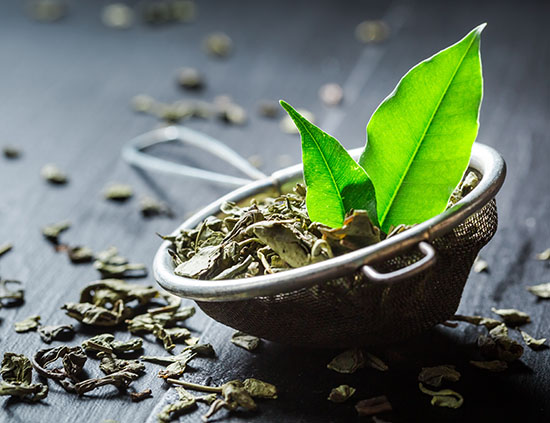
Everyday Chemicals Are Screwing Up Your Testosterone
You may have already read my other article on 7 habits which are killing your testosterone. There was a section in that on Water because

Green tea is becoming an increasingly popular addition to many people’s daily health routine.
The drink is an ancient tradition in many Oriental cultures and numerous research studies back up the health claims traditionally associated with it.
From helping prevent heart disease and increasing longevity to even preventing memory loss; green tea’s reputation as a health enhancer continues to grow.
Let’s take a look at what science says are the evidence-backed health benefits of drinking green tea.
Green tea comes from the same plant as other varieties of tea. All types of tea, except herbal tea, are brewed from the dried leaves of the Camellia sinensis bush. How fermented the leaves are determines the tea’s type.
Being one of the less processed types of tea, it retains the most antioxidants and health-enhancing polyphenols of all varieties.
The antioxidants and plant compounds found in green tea include catechins, polyphenols, and many other types of flavonoids; the same beneficial substances found in red wine, dark chocolate, and blueberries.
Epigallocatechin Gallate (EGCG) is one of the powerful compounds found in green tea. It’s been studied to treat or prevent many diseases and could be one of the reasons green tea has its reputed medicinal properties (1).
Caffeine is an active stimulant in Green Tea and while there is not as much as in a cup of coffee, there is enough to produce a response without causing “jitters”.
Caffeine actually blocks an inhibitory neurotransmitter called Adenosine and thereby can increase the firing of neurons as well as the concentration of neurotransmitters like dopamine and norepinephrine. (2, 3)
Green Tea also has an amino acid called L-theanine which increases the activity of the inhibitory neurotransmitter known as Gamma-Aminobutyric acid or GABA.
GABA has both anti-anxiety effects as well as an ability to increase dopamine in the brain. Dopamine helps regulate emotional responses, attention and learning!
It gets even better though as 2 different case studies have shown the combination of L-Theanine and caffeine actually have synergistic and powerful combined effects at improving brain function. (4, 5)
There is evidence that EGCG and other antioxidants in green tea can slow or even halt cancer cell growth, cause them to self-destruct, and prevent growth of new blood vessels in cancer tumors (6).
EGCG is the most plentiful catechin (a potent antioxidant) in green tea and is up to 75 percent of the tea’s total catechin content. It has been researched extensively in recent years to better understand its potential as a cancer-fighter.
EGCG could also block critical enzymes that help cancer to keep growing. This is because EGCG may force cancer cells to permanently stop growing by affecting an enzyme crucial to cancer development.
Researchers found that the EGCC in green tea can inhibit the production of the enzyme called urokinase that helps cancer cells to grow (7).
Additionally, skin cancer studies performed in lab animals found those that drank green tea experienced only 10 percent as many tumors as the ones just given water (8).
Free radicals created by metabolic processes in the body can cause damage in various ways, and this damage can be seen as the usual signs and symptoms of aging.
The antioxidants in green tea can neutralize these free radicals created in the body.
The presence of catechin polyphenols is largely responsible for this effect, and the most powerful of them is EPCG. Because of this, regularly consuming green tea could significantly delay many signs and symptoms of aging (9).
A recent study published in the Journal of the American Medical Association found that drinking green tea is strongly associated with reduced mortality from all causes, including heart disease.
The Researchers followed over 40,000 participants in Japan between 40 and 79 years of age for 11 years.
Those participants who had at least five cups of green tea every day showed a much lower risk of dying from any cause, but especially cardiovascular disease, than participants who had less than one cup per day (10).
An analysis of completed studies also found that drinking green tea, either in liquid or capsule form, was significantly linked to significant but modest reductions in total and LDL (bad) cholesterol (11).
This may be because the catechins and other polyphenolic compounds exert many protective effects on the body, particularly the cardiovascular system.
A study published in 2007 found evidence that green tea could be used as a new treatment for skin disorders like psoriasis or dandruff.
The researchers used an animal model for different types of skin diseases, typically involving patches of red, dry, flaking skin resulting from inflammation and overproduction of skin cells.
The test animals treated with green tea experienced slowed growth of skin cells and the presence of a gene that regulates the life cycle of skin cells (12).
A 2011 study tested the effect of a component of green tea, called colon available green tea extract (CAGTE), after it was digested, to examine how it inhibited a key protein in the development of Alzheimer’s disease (13).
This study adds to previous research suggesting green tea could help reduce the risk of Alzheimer’s disease.
In 2004, researchers examined the effects of green tea on levels of a substance essential to healthy memory and cognition, and two enzymes associated with Alzheimer’s disease.
In laboratory experiments, green tea prevented acetylcholine from breaking down, acetylcholine is a critical neurotransmitter linked with memory.
The tea also inhibited two enzymes called BuChE and beta-secretase. These are enzymes found in the protein deposits that form in the brains of Alzheimer’s patients. (14)
We included 150 mg of 4:1 concentrated Green Tea extract (equivalent to 600 mg) in our Next Level Superfoods multivitamin.
This is part of our Mental Energy, Clarity and Focus support matrix which also includes:
REFERENCES

You may have already read my other article on 7 habits which are killing your testosterone. There was a section in that on Water because

Rhodiola Rosea stands out as a potent adaptogenic herb with a rich history of traditional use and a growing body of scientific research. Revered for

In this comprehensive article, we will explore what L-tyrosine is, its benefits as a pre-workout supplement, the correct dosage, and other potential health benefits it

Betaine anhydrous is becoming an increasingly popular ingredient for pre-workouts. In this article, we will explore the fundamentals of betaine anhydrous, its connection to carnosine,

Beta-alanine is a pre-workout powerhouse. From boosting workout performance to potential anti-aging effects, discover why this amino acid is a favorite among health buffs.

You may have already read my other article on 7 habits which are killing your testosterone. There was a section in that on Water because

Rhodiola Rosea stands out as a potent adaptogenic herb with a rich history of traditional use and a growing body of scientific research. Revered for

In this comprehensive article, we will explore what L-tyrosine is, its benefits as a pre-workout supplement, the correct dosage, and other potential health benefits it
Discount Applied Successfully!
Your savings have been added to the cart.